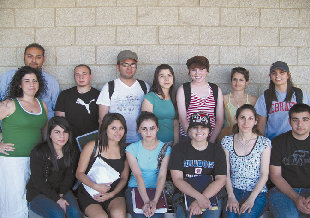Anoush Ekparian
Staff Writer

Seated, left to right: Mary Madoyan, Windy Dunbar, Ani Simonyan, Tamar Der Kevorkian, Anoush Ekparian, and Sarkis Manavazian. Standing, left to right: Stephanie Stockdale, Ghaith Saggaf, Sevag Jierian, Jaime Cardenas, Anait Kaptryan, Jamie Mackechnie, Taline Kasparian, and Allison Garabedian.
The students studied various aspects of the Genocide.
Two weeks before Armenian Martyrs Day, students gathered on April 11-12 for an intensive course study on the Armenian Genocide, in the Science II building at California State University Fresno.
Armenian Studies professor Barlow Der Mugrdechian asked students to bring in five questions concerning anything about the Armenian Genocide, as a catalyst for discussion. Questions that aroused student interest were both broad and specific: “How many persons perished during the genocide? How can Armenians work hand in hand with Turkish people to get recognition? How do oral histories help the cause of the Armenian people?” Many students, like Tamar Der Kevorkian, sophomore studying Business Administration, commented that they “wanted to know the details and reasoning behind the Armenian Genocide.”
Genocide is multifaceted and intense; and to understand the general definition of it in accordance with International Law can only provide a sterile footnote to the barbaric stories of those who have lived and died through it. Simply put, according to the United Nations General Assembly Genocide Convention, formulated in 1948, Genocide is defined as “acts committed with an intent to destroy, in whole or in part, a national, ethnical, racial or religious group.” Mass murders, as students found out, occurred much earlier than 1915 in the Ottoman Empire in order to subordinate the non-Turkish masses. Historical timelines, provided by Der Mugrdechian, invited students to take a step by step look at the systematic annihilation of Armenians and other minority groups (such as the Assyrians, Greeks, and Jews).
Student discussions were prompted by important viewings of movies such as The Hidden Holocaust (produced by BBC), The Great War (produced by PBS), The Genocide in Me (produced by Araz Artinian), and important oral histories documenting survivors found on the website www.twentyvoices.com.
Many students commented positively after watching the hotly contested, scarcely viewed PBS debate (hosted by Scott Simon) on the use of the word Genocide between Turkish historian and professors Justin McCarthy and Omer Turan and Armenian poet and professor Peter Balakian and Turkish historian and sociologist Taner Akçam. The Turkish perspective, in this debate, showed how historically inaccurate and misleading the Turkish Government has been in regards of the 1915-1923 deportations and Genocide.
Taline Kasparian, a sophomore studying Health Science, boldly stated, “I think the Turkish perspective is very childish. They are guilty for the first genocide of the 21st century.” Regardless of what many Armenian organizations may have said in order to stop the viewing of this debate, the discussion will continue until both sides have been represented fairly in order to let the world decide.
“I am not Armenian [and] I was appalled,” stated Jamie Mackechnie, a sophomore studying Dietics, “that Turkey can’t or won’t admit that what they did was actually a Genocide. I admire the pride that Armenians have.”
Another issue discussed was possible ramifications towards the United States from Turkey when the U.S. finally does recognize the atrocities of 1915-1918 as Genocide. Examples of other countries, such as France and Italy recognizing the Armenian Genocide, should prove to legislators in the United States that the Turkish Government needs the U.S., just as they need other countries that have already recognized it and have moved on, in order to stay afloat in the global network. However, to this day the House and Senate Genocide recognition resolutions get denied year after year.
The debate itself leads many observers to the conclusion that, yes, both sides have to be heard and that people can assess the facts and make the right decision. Prof. Der Mugrdechian provided ample materials to complex issues concerning both sides of the Genocide and did not sway from exposing students to the Turkish perspective. Discussion, analysis, and the introduction of materials (print, video, and web) to conduct further research on this topic were the most important issues in the framework of the class.
To be able to discuss the Armenian Genocide at a scholarly level is important. If students are not able to understand and analyze the different perspectives: historical, social, psychological and personal, the relevance of the event will continue to be put on the back burner and the issue of recognition will be at a standstill. Further study is required on many different levels and Prof. Der Mugrdechian encouraged students to continue research and analysis.
Prof. Der Mugrdechian’s invitation to examine both sides of this controversial issue in the local, national, and global levels was refreshing and welcoming.
 Hye Sharzhoom Armenian Action
Hye Sharzhoom Armenian Action